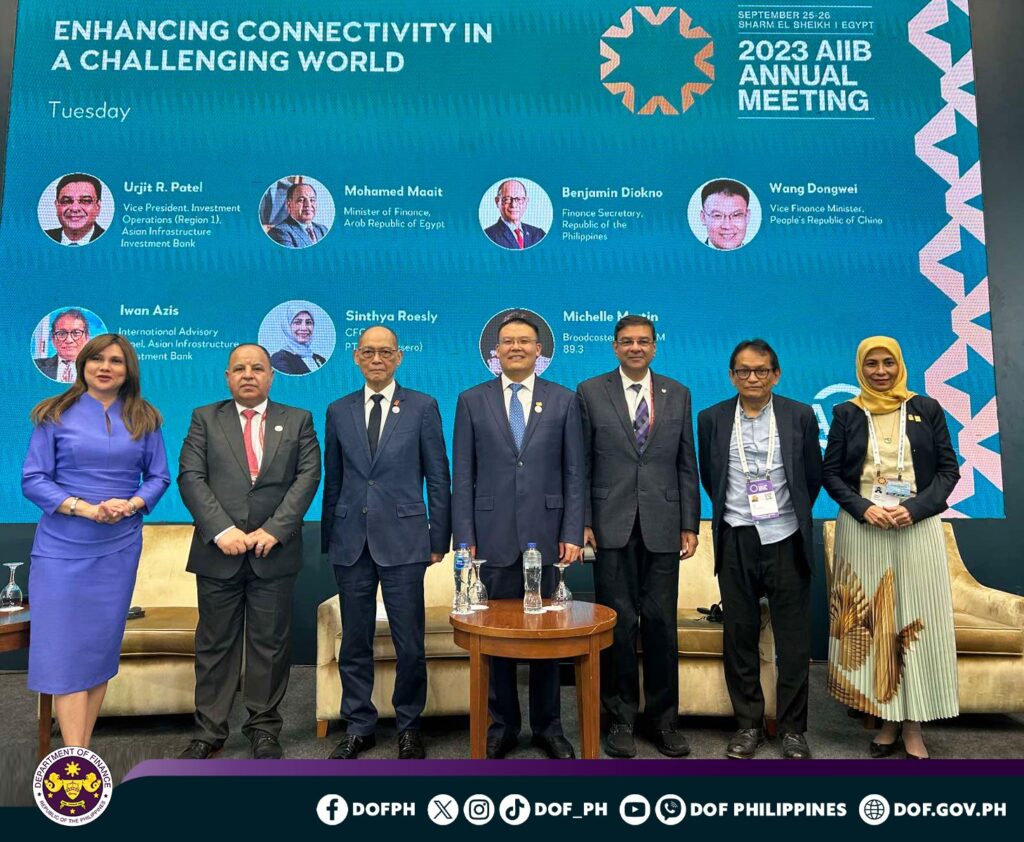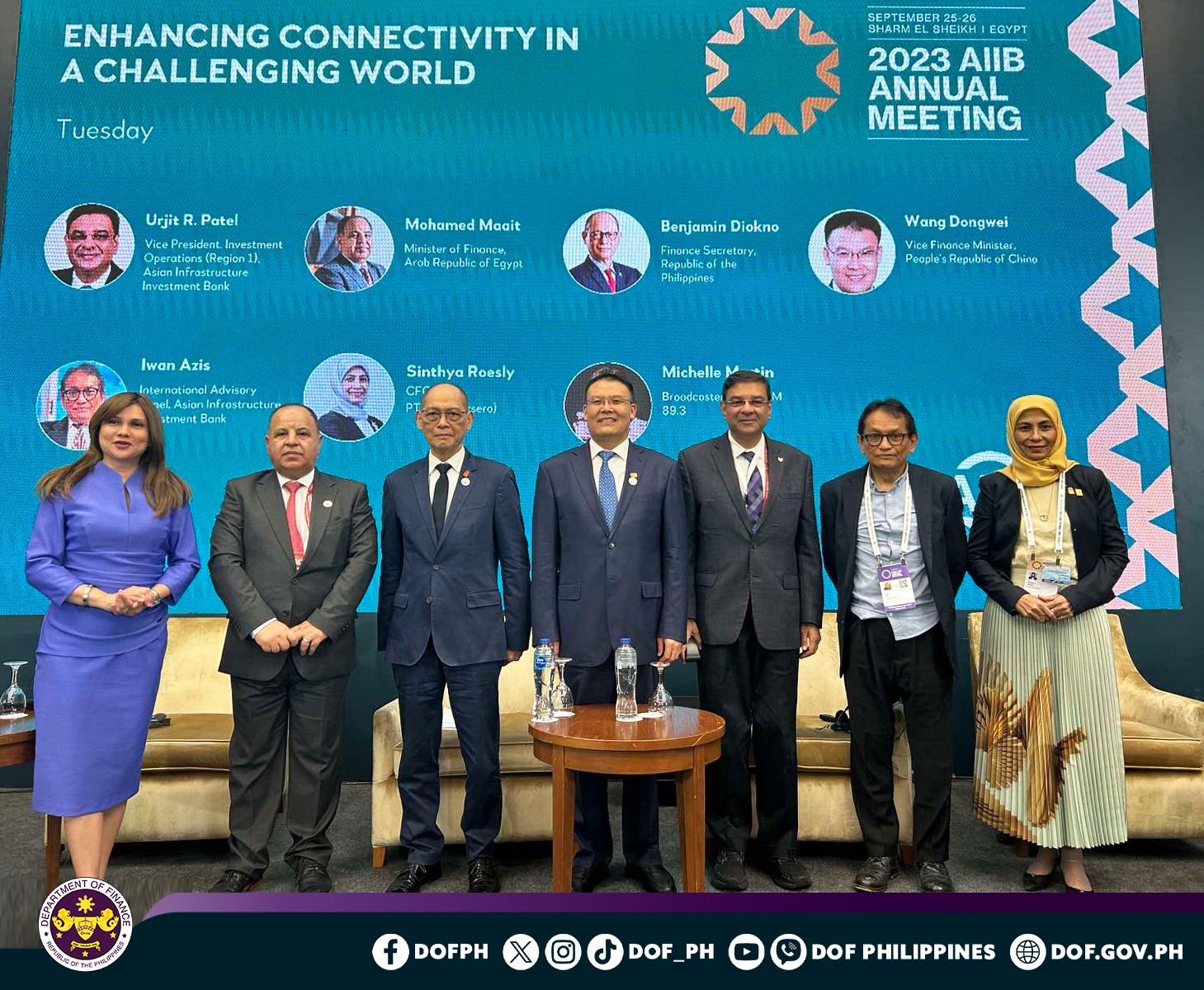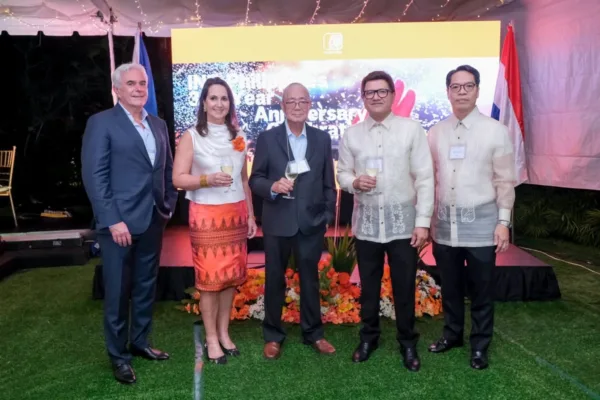Speaking during this year’s Asian Infrastructure Investment Bank (AIIB) Annual Meeting Flagship Event: Enhancing Connectivity in a Challenging World, Finance Secretary Benjamin E. Diokno has underscored the need for innovative financing solutions to support physical and digital connectivity projects.
The flagship event was held last September 26 at Sharm El Sheikh in Egypt and explored connectivity and its impact on trade and economic development. It also emphasized the crucial role that Multilateral Development Banks (MDBs) play in facilitating connectivity to enhance resilience in a challenging world.

Finance Secretary Benjamin Diokno (3rd from left) of the Philippines together with the other panelists at this year’s AIIB Annual Meeting Flagship Event: Enhancing Connectivity in a Challenging World
During the panel discussions, Secretary Diokno shared the challenges to connectivity stemming from the Philippines’ years of infrastructure underinvestment.
He cited data from 2001 to 2015 when the Philippines only spent an average of two percent of its gross domestic product (GDP) on infrastructure.
Coming from the previous administration’s successful “Build, Build, Build” program, Secretary Diokno said that the current administration is planning to arrest the years of infrastructure underdevelopment through its ambitious “Build Better More” program.
Flagship projects worth US$ 155-B
The Philippine government has prioritized 197 infrastructure flagship projects (IFPs) worth an estimated US$ 155 billion, covering energy, water, logistics, transportation, agribusiness, manufacturing, tourism, health, and education.
Diokno also shared that to ensure adequate financing, the government will be reforming its tax system and has committed to maintaining the level of spending—from 5 to 6 percent of GDP—for the duration of the president’s six-year term. The government’s fiscal commitments are embedded in the Philippines’ first-ever medium-term fiscal program.
To provide more financing support for the IFPs, the government has implemented numerous game-changing reforms to attract investments into the country, including the recently passed Public-Private Partnership (PPP) Act, which has been approved by both Houses of Congress.
The measure seeks to establish a PPP legal framework to enhance the country’s PPP policy environment for smarter and more climate-resilient infrastructure development in the country without the need to sacrifice fiscal space.
Apart from implementing the right policy tools, Secretary Diokno emphasized the importance of bilateral and multilateral development partners, saying that a sizable portion of the IFP list is being considered for official development assistance (ODA) financing support.
These are projects on physical and digital connectivity with an aggregate investment requirement of PHP 4.68 trillion (around US$ 82.5 billion) for 80 of the IFPs.
Quality implementation of infrastructure projects
During the same event, Finance Secretary Diokno also underscored the need to ensure the successful and quality implementation of infrastructure projects.
To this end, risk management solutions and policy reforms using a whole-of-government approach are being adapted and practiced in the Philippines.
Strengthening connectivity includes greater digital technology adoption. Hence, the Philippines is venturing into its first Digital Transformation Development Policy Loan, which will be co-financed by a US$ 600 million loan from the World Bank – International Bank for Reconstruction and Development (WB-IBRD).
The Program will digitalize government systems for better delivery of services, bolster financial inclusion through the wide-scale adoption of digital payments, and boost business growth in digital services.
The event was attended by AIIB Governors, economists, and connectivity project practitioners.
Urgit R. Patel, Vice President for Investment Operations of AIIB, gave his opening remarks. Meanwhile, joining the discussions as panelists alongside Secretary Diokno were Dr. Mohamed Maait (AIIB Board of Governors Chair and Minister of Finance of Egypt), Mr. Wang Dongwei (Vice Finance Minister of China), Professor Iwan Azis (Cornell University), and Ms. Sinthya Roesly (National Electricity Utility of Indonesia).








